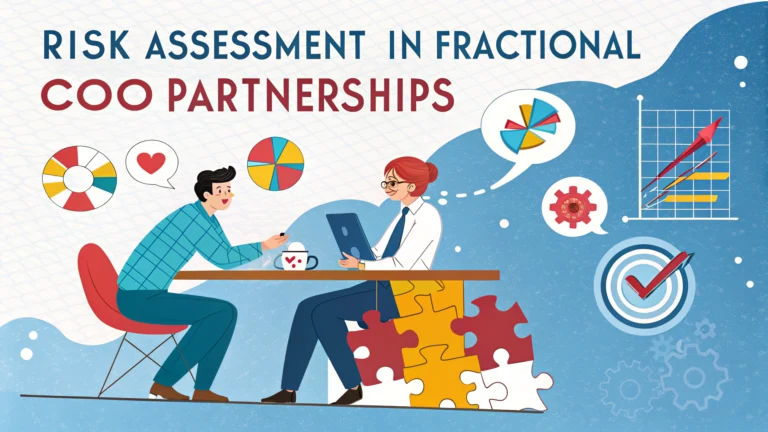Risk assessment stands as a fundamental component when establishing and maintaining fractional COO partnerships, directly impacting both the service provider and client organization.
Understanding and evaluating potential risks helps businesses make informed decisions about entering fractional leadership arrangements while protecting their interests and assets.
This guide examines key risk factors and provides practical strategies for managing them effectively in fractional COO relationships.
Common Risk Areas in Fractional COO Arrangements
- Confidentiality breaches
- Intellectual property disputes
- Operational disruptions
- Cultural misalignment
- Performance measurement challenges
- Knowledge transfer gaps
Legal Protection Measures
A well-structured contract forms the foundation of risk mitigation in fractional COO partnerships.
- Non-disclosure agreements (NDAs)
- Service level agreements (SLAs)
- Liability clauses
- Exit terms and conditions
- Performance metrics and expectations
Operational Risk Management
| Risk Category | Mitigation Strategy |
|---|---|
| Communication | Regular check-ins, documented processes |
| Knowledge Management | Digital documentation systems, transition plans |
| Team Integration | Clear role definition, stakeholder management |
Financial Risk Considerations
- Cost Structure: Clear pricing models and payment terms
- ROI Tracking: Defined metrics for measuring value
- Budget Management: Regular financial reviews
Technology and Data Security
Implement robust security protocols for data access and system integration.
- Multi-factor authentication
- Access level management
- Regular security audits
- Data backup procedures
Performance Monitoring Framework
Establish clear KPIs and evaluation criteria from the start.
- Monthly performance reviews
- Quantifiable objectives
- Feedback mechanisms
- Progress tracking tools
Cultural Integration Strategies
Address potential cultural conflicts through proactive management.
- Team alignment sessions
- Communication protocols
- Value alignment workshops
- Regular team building activities
Building a Sustainable Partnership
Focus on creating long-term value while managing short-term risks through transparent communication and aligned expectations.
- Regular partnership reviews
- Continuous improvement processes
- Scalable engagement models
- Clear escalation paths
Steps for Moving Forward
- Conduct thorough due diligence
- Establish clear contractual terms
- Implement monitoring systems
- Review and adjust regularly
- Document lessons learned
For professional guidance on fractional COO partnerships, contact the Fractional Executive Association at [email protected] or visit their website at www.fractionalexecutive.org.
Risk Assessment Best Practices
Regular risk assessments help organizations stay ahead of potential challenges and maintain healthy fractional partnerships.
- Quarterly risk reviews
- Stakeholder feedback collection
- Market condition analysis
- Compliance checks
- Emergency response planning
Change Management Protocols
Internal Changes
- Leadership transitions
- Organizational restructuring
- Process modifications
External Changes
- Market shifts
- Regulatory updates
- Industry trends
Contingency Planning
| Scenario | Response Plan |
|---|---|
| Unexpected Termination | Backup leadership pipeline, knowledge transfer protocols |
| Performance Issues | Improvement plans, mediation procedures |
| Business Disruption | Crisis management protocols, communication strategy |
Maximizing Partnership Success
Success in fractional COO arrangements requires commitment to risk management, clear communication, and adaptable strategies. Organizations that implement comprehensive risk assessment frameworks while maintaining flexibility will build more resilient and valuable partnerships.
- Maintain open dialogue
- Foster collaborative problem-solving
- Embrace continuous improvement
- Build sustainable relationships
- Prioritize long-term value creation
Remember that risk management in fractional partnerships is an ongoing process that requires regular attention and adjustment to ensure optimal outcomes for all parties involved.
FAQs
- What are the primary risks associated with fractional COO partnerships?
The main risks include misalignment of expectations, confidentiality concerns, time allocation challenges, cultural fit issues, and potential conflicts of interest if the COO works with multiple companies. - How can companies mitigate risks when engaging a fractional COO?
Companies can mitigate risks through detailed contractual agreements, clear scope of work documentation, regular performance reviews, non-disclosure agreements, and establishing clear communication protocols. - What due diligence should be performed before hiring a fractional COO?
Verify professional credentials, check references from previous clients, review track record of success, assess industry expertise, and evaluate their experience with similar-sized companies. - How should intellectual property protection be handled in fractional COO arrangements?
Implement robust IP protection through comprehensive non-disclosure agreements, non-compete clauses, and clear ownership terms for any innovations or strategies developed during the engagement. - What are the financial risks of fractional COO partnerships?
Financial risks include unexpected costs, potential overruns in contracted hours, investment in initiatives that may not complete due to limited engagement, and possible disruption costs if the partnership ends prematurely. - How can companies ensure business continuity with a part-time COO?
Establish clear handover processes, document key procedures, create emergency response protocols, and develop backup plans for critical operations during the COO’s absence. - What are the potential team management risks with fractional COOs?
Risks include resistance from full-time employees, leadership gaps during absence, potential communication breakdowns, and challenges in maintaining consistent management practices. - How should performance metrics be structured for fractional COO arrangements?
Performance metrics should include specific KPIs, measurable objectives, timeline-based goals, regular reporting requirements, and clear accountability frameworks aligned with company objectives. - What insurance and liability considerations apply to fractional COO partnerships?
Consider professional liability insurance, errors and omissions coverage, clear indemnification clauses, and appropriate business insurance to protect both parties. - How can companies protect sensitive data when working with a fractional COO?
Implement secure data access protocols, use encrypted communication channels, establish data handling procedures, and create clear policies for remote access and information sharing.







